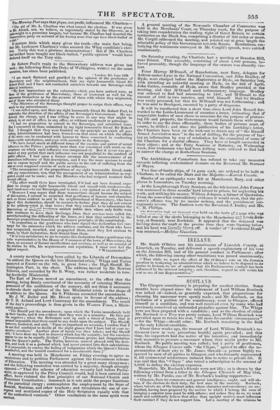Sir Robert Peel's reply to the Shrewsbury address was given
last week; the following from the Duke of Wellington, written on the same passion, has since been published.
" London, 5th June 1839. "I am much flattered and gratified by the opinion of the gentlemen of ghrewsbury and the neighbourhood, that my right honourable friend Sir Robert Peel and I have not conducted ourselves towards our Sovereign with disloy.al insolence.
"My first impressions on the calumnies which you have noticed were, as those of the gentlemen of Shrewsbury, those of contempt as well for the odumnies themselves as for the persons of those with whom they originated, And of those who circulated them.
"The Ministers of the Sovereign thought proper to resign their offices, very ouch to my astonishment. "I was called upon, and then my right honourable friend Sir Robert Peel, to undertake the direction of the affairs of our Sovereign's Government. Ile un- dertook the charge, and I was willing to serve in any way that might be wished, in or out of office, in any office, or without emorument or patronage. "I hail no proposition to submit to the Sovereign, and submitted none. But I concurred in those submitted by my right honourable friend Sir Robert Peel. I thought that they were founded on the principle on which all pre- ceding Administrations had been formed—on that alone on which the attain of the state can be conducted with honour to those cuneermA in conducting them—with satisfaction, and even with security to the Sovereign. uNire have heard much at different times of the exercise and power of secret influence in the Palace; probably more than was consistent with truth on the occasions on which such influence was compiained of But it never was pre- tended at any period that such influence was not prejudicial to the conduct of public affairs. I had upon a former occasion felt the inconvenience of an anomalous influence of this description, and I was the inure anxious to avoid now to expose myself and the public service to the risk of suffering front the real or even supposed exercise of such an influence. "The consequence of the propositions of my right honourable friend, made with my concurrence, was, that the arrangement of an Administration as sug- gested could not be made ; and the Ministers who had resigned resumed their several offices.
"The affair would there have terminated, if it had not been deemed expe- dient to charge my right honourable friend and myself' with insolence—dis- loyal insolence—to our Sovereign, and to raise a cry against us on that ground. " However I may regret that these transactions should become the subject of discussion, I cannot be surprised that gentlemen of honour and character, such as those resident in and in the neighbourhood of Shrewsbury, who have signed this declaration, should lie anxious to declare that they 16 not concur in the address voted in that town ; that they consider to be calumnious the imputation of 6islog ;ming nubile men whose only faults were their readiness to serve their Sovereign 'Ilea their services were called for, notwithstanding the difficulties of the times, red that they submitted to the Sovereign propositions foundal on the known principles of the constitutioh.
"In proportion as the gentlemen who have signed this declaration feel con- tempt for the calumnies which the address contains, and for those who have thus recognized, recorded, and propagated them, must they feel anxious to record, by their declaration, their dissent from them.
"It is very satisfactory to me to receive this declaration from a gentleman who isthe representative in the House of Commons of the town of Shrewsbury, for whom, on account of former recollections and services, as well as on account of the station he fills, his acquirements and reputation, I must ever feel the


























 Previous page
Previous page